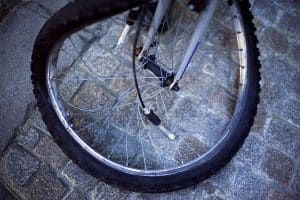A Few Days Later: Evidence, Medical Care, Lost Income

Evidence: Get these documents or information if possible:
- Police Report: Request it from the appropriate authority. (It can take a week or so to get it.)
- Witnesses: If you didn’t get any witnesses’ names at the scene, there might be some on the police report. You can also request the 911 call from the local authorities, and that may have some helpful information. (You do that through a Freedom of Information Act or “FOIA” request.)
- Photos: Take pictures of everything – bike, clothes, your body, the accident scene. Keep taking pictures of your injuries and wounds at various intervals. Those can be very helpful later.
- Garmin Data: Determine if it is helpful or not. Do not post it to Strava, and be very careful about posting on social media sites.
- Property Damage: Get a detailed estimate to repair/replace your bike/clothing from your local bike shop.
Follow-Up Medical Care: Don’t delay treatment. Even if you don’t think you are hurt too bad, it is still wise to see your preferred provider. Delay can be used against you to argue that your injuries weren’t that severe.
If your preferred provider is an M.D., don’t be surprised if they give you the song and dance of “we don’t treat people involved in auto accidents.” You might have to call another doctor’s office. (I’d estimate that 25% of my clients tell me that their own doctor will not treat those injured in auto accidents.)
If you do not have health insurance, we can get you the medical care you need with no up front money out of your pocket.
Lost Income: If you are going to be out of work or will lose income because of your injuries, start keeping track of the amount lost. You must be fastidious in doing so; include date, reason, hours, etc. With some employment, it is difficult to prove wage loss, such as with commission sales or self-employment. Nonetheless, try to keep track of all data regarding lost sales, missed bids, bonuses, etc.
